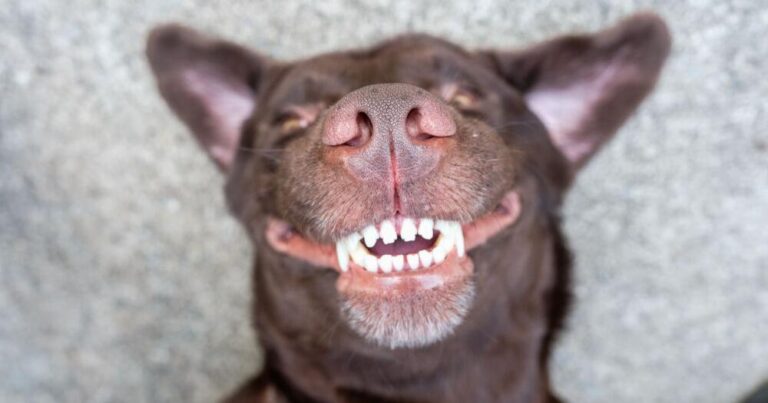February is National Pet Dental Health Month, but maintaining good dental care for your pet is essential year-round, as dental problems can also affect their overall health.
Dr. Adriana Regalado, clinical assistant professor of dentistry in the Texas A&M College of Veterinary Medicine and Biomedical Sciences, explains the importance of dental health and how a personalized cleaning routine can greatly improve your pet's quality of life. Provides insight into how unnecessary pain can be prevented. And discomfort.
The importance of good oral health
The mouth is the first passage of food in the digestive system and is home to a variety of bacteria, including those that are beneficial to digestion and those that can be harmful to your health if left to grow. Your cat's or dog's teeth are coated with a layer of good bacteria, saliva, and food particles, and if this layer isn't removed within a few days, it becomes thicker and greasy.
An overgrowth of harmful bacteria and toxins in your pet's mouth can lead to periodontal disease. Periodontal disease is a common dental disease characterized by inflammation and infection of the gums and bone surrounding the teeth.
“Dental care and hygiene are very important because they can have very serious effects on the animal's body,” Regalado said. “If an animal has severe dental disease, it can ingest harmful bacteria and toxins along with its food particles, which can have negative effects on other parts of its body.”
Small molecules such as cytokines and leukotrienes are released by cells to control the body's response to disease, but too much of these molecules can cause excessive inflammation and damage swollen gums and bones. there is.
“Good dental health can help prevent periodontal disease and the chronic inflammation associated with it, which circulates throughout the body and ultimately causes your pet to become unwell, weakening the immune system and vital organs. “In the process, the excessive production of cytokines and leukotrienes that impair the body's health is suppressed,” explained Regalado. “Dental hygiene makes a big difference in preventing disease in your pet.”
Periodontal disease can lead to further symptoms that can cause physical pain, such as, but not limited to, cavities and tooth sensitivity. Gum recession and root exposure. Formation of an abscess or infected pocket around the tooth root. In some cases, significant bleeding and jaw fractures may occur.
Early recognition of signs of poor dental health allows owners to seek veterinary care in a timely manner, reducing the risk of developing related health problems while also preventing dental problems from progressing. can be prevented.
“You should be on the lookout for bad breath, red or bleeding gums, excessive drooling or bloody drooling, and sneezing, which may be caused by an oronasal fistula, which is an abnormal connection between the mouth and nose,” Dr. Regalado says. . “Owners should also be aware of changes in behavior. They may notice their pet pecking at their face with their paws. For example, cats start rubbing their faces when they are in pain. Be friendly and playful. Your favorite dog may suddenly become reluctant to have its face touched, want to interact with its owner, or want to play at the dog park.
Regalado noted that if your pet is in pain, eating and drinking may also be difficult.
cleaning routine
Good dental habits that promote tooth and gum health include brushing. Feed them an appropriate diet, including including dental treats in their meals. and monitoring at home.
“Brushing and monitoring your pet's teeth go hand in hand, because if your pet has any dental concerns, such as an unusual lump or bump in the mouth, or a broken tooth, you'll notice it right away while brushing. ” said Regalado. “If you aren't brushing your pet's teeth every day, your concerns can get worse. That small lump could be a tumor that keeps growing until your pet can't swallow it. Or until your pet develops a tooth abscess. A broken tooth could remain there.''
However, not all dental care is one size fits all, as each pet has unique dental needs that require individual attention. Owners may also have needs that must be considered.
“Cleaning routines must be tailored to the individual pet by your veterinarian,” Regalado says. “For example, if you have a small dog, dental treats and brushing alone may not be enough because the structure of the mouth is prone to periodontal disease. Your veterinarian may recommend using certain types of toothpaste, water additives (pet mouthwash) and more frequent dental visits.
“The routine also needs to be tailored to the owner. It needs to be practical and achievable according to the owner's abilities,” Regalado continued. “Your veterinarian can help you develop dental hygiene habits that are best for both you and your pet.”
Board-certified veterinarians can also be found through the American Veterinary Dental College, and the Veterinary Oral Health Council offers tips on dental products for pet owners.
Pet owners can ensure that their pets maintain their oral health and overall well-being by staying alert for signs of dental problems and performing a proper cleaning routine with the help of a veterinarian. Ultimately, it can improve your quality of life.


